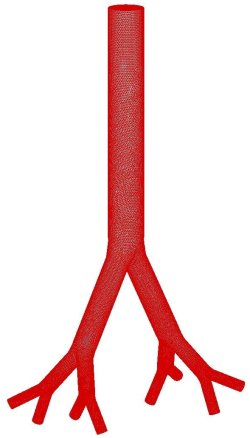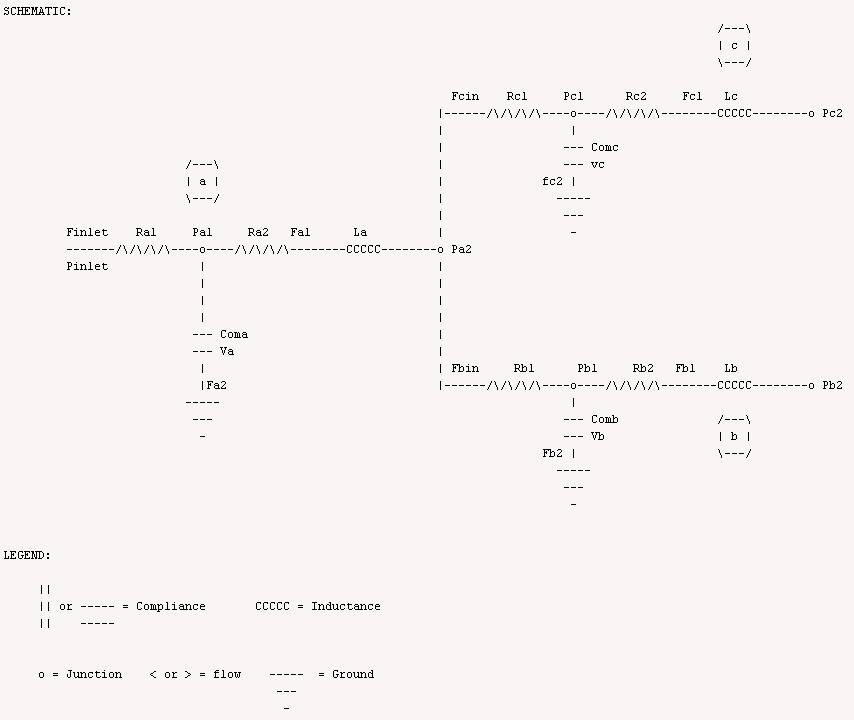This model represents four generations of the bipodial human lung. The lengths and diameter of the airways are based on the weibel model. The compliance of the airway was considered to be negligible to represent rigid airways.
Description
This model represents four generations of the bipodial human lung. The lengths and diameter of the airways are based on the weibel model. The resistance and the inductance of the airway segments were calculated based on the article by Barbini P (See reference). The capicitance of the lung was considered negligible representing a non-moving or a rigid wall. The driving force of the model was a pressure gradient. A sinewave of amplitude 10 pa and time period of 2 seconds was prescribed at the inlet. The outlets were maintained at zero pressure. The resistor in the electrical circuit represent the viscous effect or resistance near the wall and the inductor represent the inertial resistance to air.

Figure: A four generation lung

Figure: Model represented as an electrical circuit. Only one bifurcating airway shown. See model source code for complete diagram.
Equations
The equations for this model may be viewed by running the JSim model applet and clicking on the Source tab at the bottom left of JSim's Run Time graphical user interface. The equations are written in JSim's Mathematical Modeling Language (MML). See the Introduction to MML and the MML Reference Manual. Additional documentation for MML can be found by using the search option at the Physiome home page.
- Download JSim model MML code (text):
- Download translated SBML version of model (if available):
We welcome comments and feedback for this model. Please use the button below to send comments:
Barbini, P, C. Brighenti, G. Cevenini,and G. Gnudi; A Dynamic Morphometric Model of the Normal Lung for Studying Expiratory Flow Limitation in Mechanical Ventilation. Ann. Biomed. Eng.Annals of Biomedical Engineering, Vol. 33, No. 4, May 2005, pp. 518–530 Weibel, ER: Morphometry of the Human Lung. Berlin: Springer-Verlag, 1963.
Please cite https://www.imagwiki.nibib.nih.gov/physiome in any publication for which this software is used and send one reprint to the address given below:
The National Simulation Resource, Director J. B. Bassingthwaighte, Department of Bioengineering, University of Washington, Seattle WA 98195-5061.
Model development and archiving support at https://www.imagwiki.nibib.nih.gov/physiome provided by the following grants: NIH U01HL122199 Analyzing the Cardiac Power Grid, 09/15/2015 - 05/31/2020, NIH/NIBIB BE08407 Software Integration, JSim and SBW 6/1/09-5/31/13; NIH/NHLBI T15 HL88516-01 Modeling for Heart, Lung and Blood: From Cell to Organ, 4/1/07-3/31/11; NSF BES-0506477 Adaptive Multi-Scale Model Simulation, 8/15/05-7/31/08; NIH/NHLBI R01 HL073598 Core 3: 3D Imaging and Computer Modeling of the Respiratory Tract, 9/1/04-8/31/09; as well as prior support from NIH/NCRR P41 RR01243 Simulation Resource in Circulatory Mass Transport and Exchange, 12/1/1980-11/30/01 and NIH/NIBIB R01 EB001973 JSim: A Simulation Analysis Platform, 3/1/02-2/28/07.

